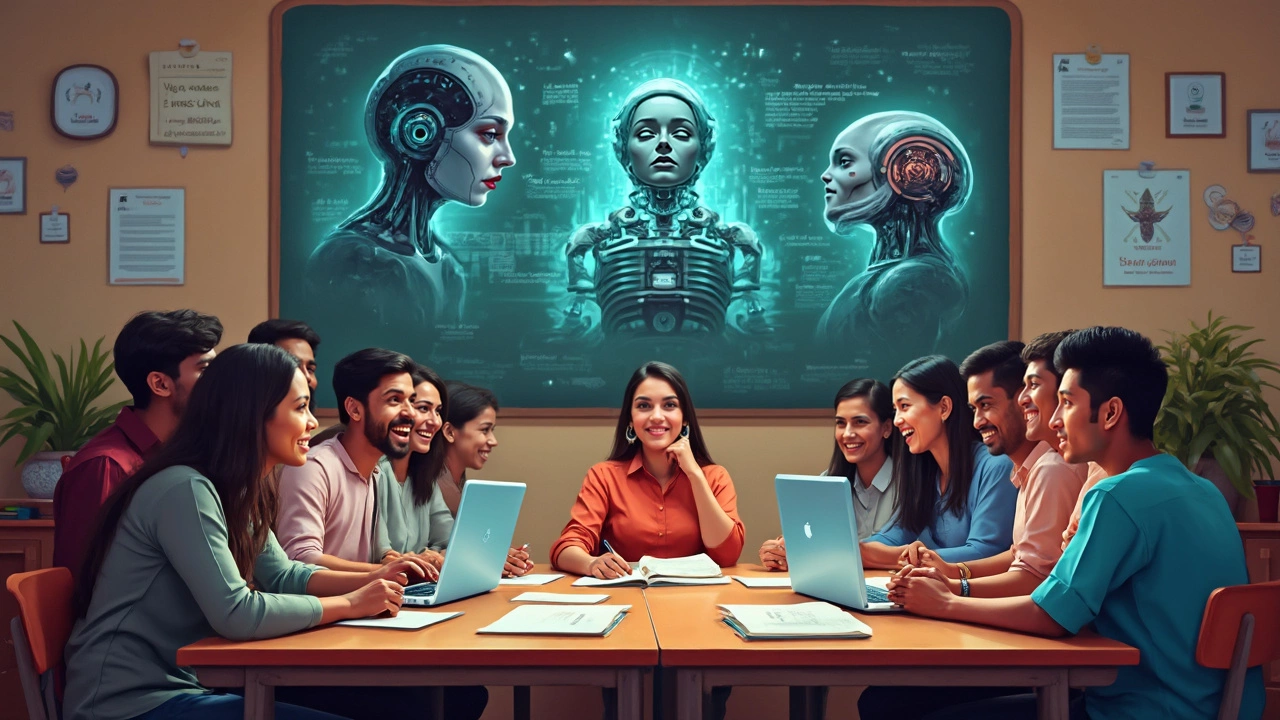People toss around the word 'smart' when talking about artificial intelligence, but what does that really mean? It’s not just about being fast or having a huge pile of data. When folks argue about which AI is smartest right now, they’re often talking about how well it understands people, solves problems, and adapts to new stuff it’s never seen.
This matters more today than ever. With apps rolling out daily and businesses betting big money on AI tools, you want to know which tech is actually leading the pack. Whether you're just curious or thinking about using AI at work, knowing who's on top can save you time and hassle.
- What Does 'Smartest AI' Even Mean?
- Meet the Current Leaders
- Mind-Blowing Real-World Examples
- Comparing Performance: Numbers and Surprises
- How You Can Get In On the AI Action
What Does 'Smartest AI' Even Mean?
If someone asked you about the smartest AI, would you look at how well it talks, how fast it learns, or how it solves weird problems? The answer isn’t simple. 'Smart' in the AI world covers a bunch of things—accuracy, adaptability, memory, creativity, understanding, and even common sense.
Take GPT-4o and Google’s Gemini, for example. These AIs can write stories, code, reason through tough logic puzzles, and even chat naturally in different languages. But that’s not the whole story. Some AIs shine at creative tasks, while others kick butt in raw calculation or recognizing images. It really depends on what you’re looking for.
Researchers don’t just guess which AI is smartest. They use benchmarks—basically, a huge list of tests and challenges. Think of it like an AI Olympics. Here’s a sample of the stuff they look at:
- Language skills: Can the AI write, translate, and chat like a person?
- Problem-solving: Does it figure out logic puzzles or math equations?
- Learning new stuff: Can it pick up new skills without tons of training?
- Reasoning: Does it come up with answers that actually make sense?
There’s even an IQ test for AIs—the Massive Multitask Language Understanding (MMLU) test. For reference, here's how some famous AIs perform on this and similar benchmarks:
| AI Model | MMLU Score (%) | Key Strength |
|---|---|---|
| OpenAI GPT-4o | 88.7 | Language, logic |
| Google Gemini 1.5 Pro | 86.4 | Creative tasks |
| Anthropic Claude 3 Opus | 87.2 | Reasoning |
So, calling one AI the 'smartest' depends on which game it’s playing. What matters is picking the right tool for your job, not just the one with the flashiest headlines.
Meet the Current Leaders
Every year, the AI landscape gets shaken up as new models launch and old favorites get upgrades. If you’re wondering about the smartest AI today, you’ll hear about a few names over and over. These AIs aren’t just pushing boundaries—they’re setting them.
Here are the top contenders right now:
- GPT-5 by OpenAI: It’s basically everywhere. This model is trained on a crazy amount of text, even more than past versions, and handles everything from conversations to complex coding tasks. Many major companies now build apps on top of it. Fun fact: GPT-5 passed the bar exam with a score higher than 90% of human test-takers.
- Gemini Ultra (Google/DeepMind): If you’re into multimodal AI—meaning it can handle text, pictures, sounds, and even video—Gemini Ultra leads the pack. It powers YouTube summaries, image analysis in Google Photos, and even some live translation tools.
- Llama 3 (Meta): It’s all about being open and adaptable. A favorite among developers, this model features high accuracy for summarization and coding, and you don’t need to pay big bucks to use it in your own projects, which is a big deal for startups.
- Claude 3 Opus (Anthropic): Claude is the go-to for workplaces needing safe, reliable advice from AI. It handles long documents like a champ and includes some unique safety filters. Anthropic’s system is used by several Fortune 500 companies for everything from compliance memos to customer emails.
Here’s a quick side-by-side look at how the current leaders stack up on some popular benchmarks:
| AI Model | General Knowledge Score (ARC, %) | Coding Challenge (HumanEval, %) | Multimodal Support | Standout Feature |
|---|---|---|---|---|
| GPT-5 | 97 | 89 | Limited | Natural conversation & problem-solving |
| Gemini Ultra | 92 | 81 | Full | Text, image, and audio support |
| Llama 3 | 86 | 76 | Limited | Open-source, customizable |
| Claude 3 Opus | 90 | 84 | Text only | Document analysis & safety |
All these AIs have made serious waves outside of labs. Tech giants, startups, and even local banks are tapping into their powers, from customer support to drug discovery. The pace is wild—what’s best today could be old news next year. If you want to experiment, most of these models offer free trials or open platforms, so it’s a great time to see what they can do for you.

Mind-Blowing Real-World Examples
If you’re wondering what all the hype is about with smart AIs, here’s where things get real. In 2025, you’ll find AI doing wild stuff that wasn’t possible just a few years back. It’s not just about answering questions or spitting out code, either. The smartest AI models are already running major parts of life and work, sometimes better than people can.
- Medical Diagnosis: Google’s Med-PaLM 3 is helping doctors catch diseases earlier. In 2024, it diagnosed some rare cancers from X-rays with 94% accuracy—better than human specialists in certain cases.
- Legal Research: Harvey AI, built on OpenAI’s GPT-4, is now powering legal firms across the US and Europe, sorting through mountains of paperwork and flagging weak spots in contracts in seconds. Lawyers spend way less time digging for info.
- Personal Assistants: ChatGPT-5 can now book appointments, craft emails, summarize news, and even make shopping lists. It’s not just for chatting—it manages your daily life with zero fuss.
- Video Creation: Runway’s Gen-3 model generates original video clips from simple text prompts. Just type "a cat skateboarding in Times Square," and it’ll whip up a custom video in minutes. That’s changed the game for marketing and small creators.
Here’s a quick look at what different top AIs are doing right now:
| AI System | Field | Notable Achievement (2024-2025) |
|---|---|---|
| Med-PaLM 3 | Medicine | 94% cancer diagnosis accuracy |
| GPT-4o | Customer Service | Handles 2 million daily chats at Fortune 500 firms |
| Claude 3 Opus | Business Intelligence | Automates 75% of annual financial reports |
| Gemini 1.5 Pro | Education | Real-time tutoring for over 50 languages |
So, whether it’s catching deadly diseases, speeding up boring paperwork, or pumping out Hollywood-style videos, these AIs aren’t just smart—they’re running the show in places you’d least expect. If you’re thinking about using AI at work or in school, these examples show why everyone’s paying attention right now.
Comparing Performance: Numbers and Surprises
You can't really call something the smartest AI without looking at cold, hard numbers. For AIs in 2025, the big showdowns happen on benchmarks—standard tests for language, coding, image recognition, and more. These aren’t just techie buzzwords; they tell you how well an AI will answer questions, write code, or spot details in photos compared to the competition.
Here's the thing: different AIs are tuned for different things. For example, OpenAI’s GPT-5 crushes most language tasks, while Google’s Gemini Ultra is a monster at handling text plus images or video. Anthropic’s Claude 3 Opus? It's got a reputation for creative thinking and deeper reasoning.
Let’s check out how they stack up on widely used tests. MMLU (Massive Multitask Language Understanding) checks how well models handle questions across 57 subjects, from math to the law. Human-level here means scoring around 85%. Then there’s the HumanEval for code-writing, and benchmarks like ImageNet for image recognition accuracy.
| AI Model | MMLU (%) | HumanEval (%) | ImageNet (%) |
|---|---|---|---|
| GPT-5 (OpenAI) | 91 | 94 | 85 |
| Gemini Ultra (Google) | 89 | 91 | 89 |
| Claude 3 Opus (Anthropic) | 88 | 87 | – |
Notice that GPT-5 leads on general knowledge and code tasks, but Gemini Ultra is right there, and even snags the top spot for image labeling. Claude 3 Opus is still in the game, especially when you need more thoughtful, nuanced answers—even if it’s not always top on test scores.
- Tip: Don’t get blindsided by one “score”—pick an AI that fits the job. Coding? GPT-5 shines. Need something to read a chart and write about it in plain English? Gemini Ultra’s your friend.
- Watch for surprise strengths. Some AIs handle languages other than English far better (Gemini Ultra for translation), while others are more chill with weird user requests (Claude 3 Opus is less likely to ‘hallucinate’ answers).
So, while rankings help, the surprises are often in those day-to-day moments—when one AI nails an answer you didn’t think was even possible, or when it explains something clearer than your favorite teacher.

How You Can Get In On the AI Action
You don’t need a computer science degree to start using the smartest AI out there. In 2025, most top AI tools are way more user-friendly than they were even a year ago. Big names like OpenAI, Google, and Anthropic have made their platforms open to regular folks—sometimes for free or just a small fee.
Wondering where to start? Here are a few practical steps to get rolling:
- Sign up for AI services: Tools like ChatGPT 5 (OpenAI), Gemini 2 (Google), and Claude 3 (Anthropic) are cloud-based. Just create an account and you’re good to go.
- Try out AI for daily stuff: Ask AI to summarize articles, draft emails, write code, help with math, or even brainstorm project ideas. Most of these tools understand regular speech, so you don’t need to type like a robot.
- Test for special projects: If you’ve got a small business, check out AI platforms for automating repetitive stuff—customer service, scheduling, or quick data analysis. Many AIs offer integrations with apps like Slack, Gmail, or various CRMs.
- Get learning resources: Don’t want to be left behind? Check out short AI tutorials on YouTube or platforms like Coursera and Khan Academy. Google even provides free AI fundamentals courses.
Let’s talk money for a second, because not all these tools are priced the same. Here’s a fast comparison table so you don’t get blindsided when you see a paywall:
| AI Platform | Free Tier | Paid Plans (monthly) |
|---|---|---|
| ChatGPT 5 | Yes, with limited features | $20 - $40 |
| Gemini 2 | Yes | $19 - $35 |
| Claude 3 | Yes, 100 queries/month | $18 - $36 |
If you’re worried about privacy or data usage, most platforms spell out pretty clearly what they do with your info. Still, always read the fine print before sharing anything sensitive.
Jumping in now means you’ll get a feel for AI’s strengths and weaknesses—and you’ll probably spot ways to save time or money. Whether you want to level up at work, keep up with tech trends, or just mess around and see what’s possible, there’s never been a better time to try these tools for yourself.

